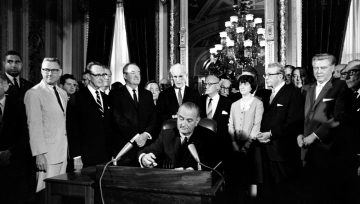From History.com:
 The Voting Rights Act of 1965, signed into law by President Lyndon B. Johnson, aimed to overcome legal barriers at the state and local levels that prevented African Americans from exercising their right to vote as guaranteed under the 15th Amendment to the U.S. Constitution. The Voting Rights Act is considered one of the most far-reaching pieces of civil rights legislation in U.S. history.
The Voting Rights Act of 1965, signed into law by President Lyndon B. Johnson, aimed to overcome legal barriers at the state and local levels that prevented African Americans from exercising their right to vote as guaranteed under the 15th Amendment to the U.S. Constitution. The Voting Rights Act is considered one of the most far-reaching pieces of civil rights legislation in U.S. history.
Lyndon B. Johnson assumed the presidency in November 1963 upon the assassination of President John F. Kennedy. In the presidential race of 1964, Johnson was officially elected in a landslide victory and used this mandate to push for legislation he believed would improve the American way of life, such as stronger voting-rights laws. After the Civil War, the 15th Amendment, ratified in 1870, prohibited states from denying a male citizen the right to vote based on “race, color or previous condition of servitude.” Nevertheless, in the ensuing decades, various discriminatory practices were used to prevent African Americans, particularly those in the South, from exercising their right to vote. During the civil rights movement of the 1950s and 1960s, voting rights activists in the South were subjected to various forms of mistreatment and violence. One event that outraged many Americans occurred on March 7, 1965, when peaceful participants in a Selma to Montgomery march for voting rights were met by Alabama state troopers who attacked them with nightsticks, tear gas and whips after they refused to turn back.
More here. (Note: Throughout February, at least one post will honor The Black History Month. This year’s theme is “African Americans and the Vote.” Readers are encouraged to send in their suggestions)
